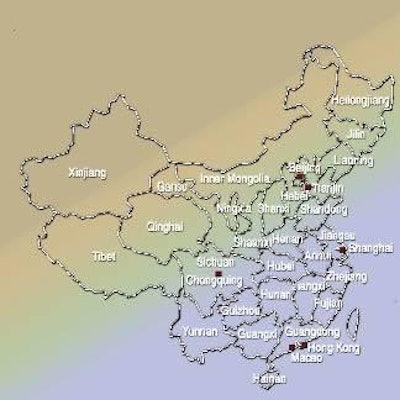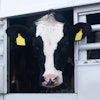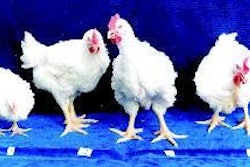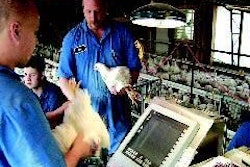
When reporting that national production of 540.77 million pigs in the first 9 months of 2006 meant a 3.5% increase from the previous year, China's ministry of agriculture also went on to name the Top 5 pig-producing provinces in the country. Heading the list was Sichuan, followed by Henan, Hunan, Shandong and Hebei.
In fact this was hardly surprising because they are the regular contenders to be regarded as the largest provincial producers in China. Pig International in September 2006 presented an exclusive guide to the Chinese provinces with the most total pigs and the most breeding sows. Sichuan was easily top, at 59 million pigs for on-farm inventory and 5.4 million for sows, ahead of Henan (47 million pigs and 4.8 million sows), Hunan (40 million pigs and 4 million sows), Hebei (27.5 million pigs and 3 million sows) and Shandong (27 million pigs and 3.2 million sows). Indeed, other sources calculate that 9 provinces between them account for two-thirds of all China's pig production.
A more difficult assignment until recent times has been to try to name the Chinese meat companies that rate as the biggest nationally. But help with this has come from the China Meat Association. Ahead of the World Pork Congress that will take place in Nanjing, China, in September this year, the association indicates (see Table) that the 10 most sizeable players can be found currently in the provinces of Jiangsu, Shandong, Henan, Jilin and Inner Mongolia. So the traditional areas in the centre-south of the country are represented, but so too are more northern provinces less associated with pig production in the past.
With China's meat and fish business in 2005 valued at more than US$6 billion, sales for Shineway (Shuanghui) from Henan province reached nearly US$2.6 billion to confirm the group as the country's largest in meat products. Shineway has ended 2006 in a new situation, however. After 48 years as a state-owned enterprise it is now under foreign ownership. Its takeover for US$328 million by US-based investment group Goldman Sachs was approved recently by the Chinese government.
Slaughtering 15 million pigs per year in China, Shineway also has production interests reported to include a multiplication herd of 2500 GP sows generating parent gilts for commercial herds. Previously it was owned under its formal name of Henan Shuanghui Group through the assets management commission of the provincial government of Henan. The group and its publicly-traded arm Shuanghui Investment and Development have been sold to a Hong Kong-based consortium known as Rotary Vortex in which Goldman Sachs is the 51% majority shareholder with CDH China Fund as the other main investor.
Of particular interest to local observers is that Goldman and CDH together hold about 13% of the shares in Shineway's main competitor, Nanjing-based Yurun. Yurun's sales in the first 6 months of 2006 totalled about US$265 million. This company is listed as Yurun Food Group on the Hong Kong stockmarket and operates a China-wide business based on chilled and frozen pork products.
Yurun was itself in the news at the end of last year when it paid about US$24.5 million for 2 of its subsidiaries, Nanjing Yurun Food Co and Anhui Yurun Meat Processing, to buy factory land assets formerly held by its chairman and his wife. The move was said to be in line with a development strategy to expand the company's scale of production, by using the land to build more slaughtering facilities. Local reports say Yurun has a target of extending its slaughter capacity to 16 million pigs/year by the end of this year.
The fragmented nature of China's meat industry was illustrated by an estimate that it consisted of no fewer than 30 000 businesses and even the largest among them held a market share of no more than 5%. But more processors are joining Shineway and Yurun in being whole-line operators with interests stretching from slaughtering the pigs through to retailing the pork. An increasing number, too, have their own production network supplying the pigs to the factories.
Covering pig breeding, production and processing, the Chuming Group of north-east China stood 41st among Chinese companies for sales in 2005. Chuming currently slaughters around 400 000 pigs per year and it has been chosen by supermarket chain Carrefour as the retail giant's Quality Line pork supplier in the north-east of the country. The company's slaughterhouse in Wafangdian, Liaoning province, has operated since 2004.
Towards the end of 2006, a statement by Chuming made clear that its recent opening of a new 200 000 tons/year feedmill at Wafangdian was to support its expansion of contract pig production in the peninsula of Dalian. The US$2.9 million mill produces mixed feeds and premixes mainly for pigs. Before its construction, Chuming sourced all feed for its own farms and contract units from supply companies.
There is capacity for expansion. The group's Wafangdian slaughterhouse can handle up to one million pigs per year and Chuming also plans to expand in meat processing. Its livestock department director Li Junsheng says that, to make full use of the slaughterhouse, the aim is to build the contract production network so it covers 1000 farms by 2009.
Additionally, China's meat processors are moving into the retail area. One example is Zhongpin from Henan province. It recently extended its presence into north-east China by signing an agreement with Heilongjiang Gongzhun Meat Co to lease an 80 tons per day chilled/frozen pork production facility at Hailun City, in Heilongjiang province. Zhongpin has made no secret of its desire to build a national brand in pork for sale through its own stores. Already it owns more than 2480 retail outlets nationwide.
Retailing is also among the activities of Tianson Foods, more correctly called Chongqing Tianson Food Holdings Co Ltd and located in the central-China administrative area of Chongqing. Additionally, Tianson produces pigs for its own slaughter/processing plants and makes the feeds for the production sites in its own feedmill. Now its name can be added to those of Chinese integrators in which there is some foreign ownership, because an agreement to purchase equity in Tianson was signed at the end of 2006 by pork production company Hytek from Manitoba in Canada.
The alliance lines the Chinese integrator with one of Canada's largest producers. Latest estimates suggest Hytek operations in Canada and the USA comprise some 57 000 sows. Meanwhile Tianson has also undertaken a licensing arrangement to stock its nucleus herd with animals from Hytek's Saskatchewan breeding subsidiary Fast Genetics and to become a distributor in China for its stock. PIGI

















